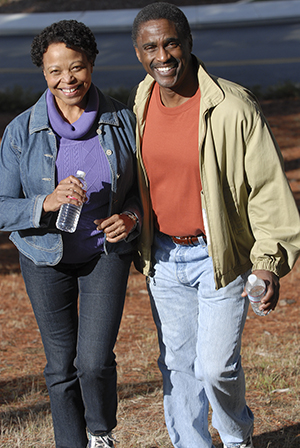After Heart Valve Surgery
For the first 6 to 8 weeks after surgery, you’ll gain a little more energy and strength each day. Your healthcare provider will discuss what you can and can’t do as you recover. Some days will be easier than others. Remember to take things slowly and rest when you get tired.
Walking
-
Walking pumps blood to your heart. This improves blood flow all over your whole body.
-
Start with a short walk (maybe 5 minutes). Walk for a little longer each day.
-
Choose a safe place with a level surface. This might be a local park or mall.
-
Wear shoes with good support. This will help prevent injury to knees and ankles.
-
Walk with someone. It’s more fun and helps you stay with it.

Showering
-
Don't use very hot water, especially on the cuts (incisions). It can affect your circulation and make you dizzy.
-
Ask someone to stand nearby in case you need help.
Driving
-
Let others drive you around for the first 4 to 6 weeks after your surgery, or as directed by your healthcare provider.
-
Motion can make pain worse and injure your breastbone.
-
Some of your medicines may make you drowsy.
Easing into activity
-
After a few weeks, you can start doing light work around your home, such as making simple meals and washing dishes.
-
Most healthcare providers advise against lifting anything that weighs more than 5 pounds Your provider may give you a different weight limit. Don't do activities that require raising your arms above the height of your shoulders. For instance, don't reach up to get items from higher shelves.
-
Don't do mowing or vacuuming. These motions can strain your breastbone.
-
Your provider can advise you about the best plan for returning to work. It will depend on the type of work you do, such as a desk job, or a more active job.
-
Discuss with your provider when you can resume having sex. This will depend on the type of surgery you had. For instance, if your breastbone was cut, your provider may advise waiting 2 to 4 weeks. Or waiting until you can easily climb 2 flights of stairs or walk a 1/2 mile.
Medicines your healthcare provider may prescribe
-
Blood-thinner (anticoagulant). This medicine prevents bleeding or blood clots that could lead to a stroke.
-
Antibiotic. This helps prevent infection that could scar and destroy your new heart valve. You'll be told when to take this medicine. That might be before dental work, surgery, or other medical procedures.
When to call your healthcare provider
Call your healthcare provider right away if you have any of these:
Call 911
Call 911 if any of these occur:
-
New or abnormal chest pain or belly (abdominal) pain
-
Feeling dizzy or faintness
-
New or abnormal shortness of breath
-
Cough up red blood or have red blood in your stool
-
Irregular, slow, or fast heart rate
-
Sudden numbness in arms, legs, or face
-
Sudden severe headache
Online Medical Reviewer:
Rita Sather RN
Online Medical Reviewer:
Robyn Zercher FNP
Online Medical Reviewer:
Steven Kang MD
Date Last Reviewed:
3/1/2024
© 2000-2025 The StayWell Company, LLC. All rights reserved. This information is not intended as a substitute for professional medical care. Always follow your healthcare professional's instructions.